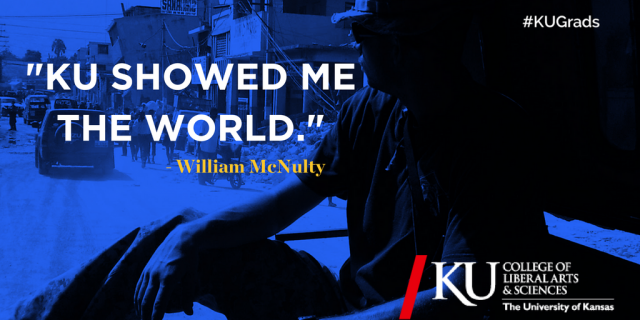William McNulty’s time on the Hill propelled him into a life lived around the world and a career as a nonprofit leader. McNulty, a 2001 graduate in economics and communication studies, is the 2017 recipient of an honorary doctorate from KU.
I was a late bloomer. I entered KU with a bare face and wide-eyed naiveté. I wanted to study economics because I thought an intricate understanding of how markets worked would make me a ruthless business mogul someday. My years at KU were transformative to say the least. Today, I have a beard and run a nonprofit.
What changed? KU showed me the world. It was a melting pot with students from more than 105 countries, while I’d only ever known life within one. I left the United States for the first time to study abroad in Italy at CIMBA, a university consortium program assembled and led by KU. My econ classes also cultivated a deep fascination for the way cultural forces influence human behavior. I became obsessed with trying to understand how small changes in local markets can create ripple effects across the globe.
A few days before that graduation walk down Mount Oread and into the stadium, I strolled into the Marine Corps Recruiting Station on Louisiana St. and enlisted as an infantryman, an unusual route for a college graduate. I wanted the experience of being the most junior Marine in a unit. I thought it would make me a better leader. I think the economist in me also knew that the only way to get a genuine understanding of the culture that powers the Marines would be to live it from the ground-up.

I cofounded Team Rubicon after 10 years serving in various capacities in uniform as a Marine and as a civilian intelligence officer. In 2010, my buddies and I wandered into Haiti where an earthquake had just marked the worst humanitarian crisis of our lifetimes. We were searching for a way to help. What we found in serving that community was a renewed sense of purpose, community and identity that we didn’t realize we had lost since leaving the military. This sentiment seemed to resonate with other veterans too. And as Team Rubicon began to grow, I knew that the success of our unusual business model in which veterans and disasters rebuild one another, could eventually have global reach. Thousands of non-American veterans began registering their interest with Team Rubicon. The humble operation that we built in the U.S. is now replicated in five countries around the world.

This is how KU plants seeds for global change. At KU, you learn that the world is bigger than your own backyard, and that your place in it, however small it seems at first, will matter to an organization, and will matter to the world.
I am humbled to be recognized by KU this spring with an honorary doctorate. That stimulus I found at KU to understand cultural nuances, to build alliances through shared experience, led me to a career that sustains my desire to serve others.
Originally published in the KU Collegian, spring 2017
